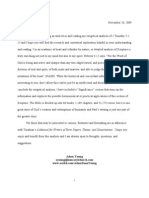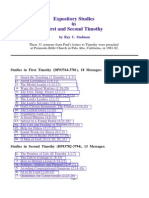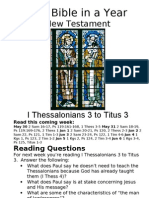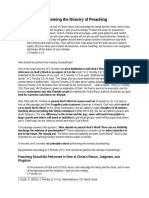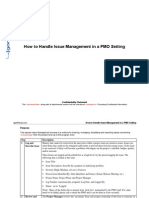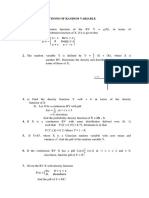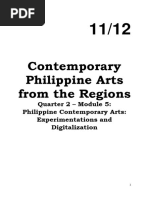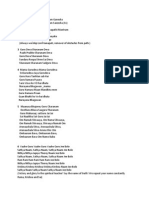Second Timothy: Gene Taylor
Second Timothy: Gene Taylor
Uploaded by
tkurasaCopyright:
Available Formats
Second Timothy: Gene Taylor
Second Timothy: Gene Taylor
Uploaded by
tkurasaOriginal Description:
Original Title
Copyright
Available Formats
Share this document
Did you find this document useful?
Is this content inappropriate?
Copyright:
Available Formats
Second Timothy: Gene Taylor
Second Timothy: Gene Taylor
Uploaded by
tkurasaCopyright:
Available Formats
Investigating the Word of God
Second Timothy
Gene Taylor
Gene Taylor, 2006. All Rights Reserved.
Investigating the Word of God: Second Timothy Gene Taylor -1-
An Introduction to Second Timothy
Timothy, the Man
The name Timothy is the English form of the Greek Timotheus. The name originally meant
honoring God.
Timothy was born in the city of Lystra of a Greek father and a Jewish mother. He was reared in
the Jewish faith and was taught the Scriptures by his mother and grandmother from early
childhood. (2 Tim. 3:15; 1:5)
The apostle Paul discovered him at Lystra (Acts 16:1-3). He joined Paul in his labors and shared
in them throughout the rest of his life. He was with Paul in prison in Rome during the first
imprisonment for his name appears in the heading of Colossians (1:1) and Philemon (v. 1). After
Pauls release, he evidently traveled with him as far as Ephesus and was left there to minister to
the needs of the church. At the end of Pauls life, he joined him again in Rome. (2 Tim. 4:11-21)
He was evidently a trustworthy, if not forceful character. He gave the impression of immaturity,
although he must have been about 30 years of age when Paul left him at Ephesus. The indication
is that he was timid (2 Tim. 1:6-7), and that he had some difficulty with his health (1 Tim.
5:23). (Roy Cogdill, The New Testament Book-by-Book, p. 102)
The Author of the Book
From the most ancient times the two epistles to Timothy have been accepted by the church as
written by Paul. (William S. Deal, Bakers Pictorial Introduction to the Bible, pp. 375-376)
All three books (The epistles to Timothy and Titus - GT) begin with the claim that the writer
was Paul the apostle (I Tim. 1:1; cf. 2:7; II Tim. 1:1; Titus 1:1). The authors analysis of his
spiritual past agrees with the Book of Acts (I Tim. 1:11-15). His identification of Timothy and
Titus as his sons in the faith is definitely a Pauline designation (I Tim. 1:2, 18; II Tim. 1:2; 2:1;
Titus 1:4). (Robert G. Gromacki, New Testament Survey, p. 291)
Investigating the Word of God: Second Timothy Gene Taylor -2-
The Date of the Book
The Letter is usually dated shortly before Pauls execution by Nero in Rome, perhaps between
66 and 68 A.D. (Cogdill, 107)
Within three years after his release from his Roman imprisonment, Paul was arrested and taken
back to Rome. The cause of his arrest is unknown. Some have suggested that Nero blamed the
burning of Rome upon the Christians since they believed and taught a destruction of the world by
fire (cf. II Peter 3:10-14). Since Paul was known to Nero as one of the leaders of this new
religion, he was naturally apprehended...Out of a concern for Timothy and a desire to see him
before his death, Paul wrote to his young associate who was probably still at Ephesus to rejoin
him at Rome. Thus, this book was Pauls last, written from a Roman prison shortly before his
martyrdom (A.D. 64-67). (Gromacki, 302-303)
Why This Book Was Written
Paul found himself under very severe circumstances. His first imprisonment had been entirely
restrictive and yet, he had been able to look forward to his release. The second imprisonment,
however, had been in the dungeon of the Mamertime prison, where it seems that only Luke, his
faithful physician, was allowed to minister unto him (4:11); and he felt sure that this
imprisonment would end his earthly ministry (4:6). Paul longed for a last visit with his son in
the gospel, Timothy, and writes him requesting him to come and bring Mark with him, as well
as the cloak that he had left in Troas, and his books, especially the parchments (4:11-13). The
Letter, therefore, is to a great extent a personal letter of the great Apostles farewell. At the same
time, he wished to encourage Timothy because of the heavy burden that he bore in the work at
Ephesus. He also wished to exhort and encourage him that he might endure faithfully in bearing
that burden in fulfilling his obligations. (Cogdill, p. 107)
In 2 Timothy, Paul writes as one who knows his days on earth are quickly drawing to a close.
About to relinquish his heavy burdens, the godly apostle seeks to challenge and strengthen his
faithful but somewhat timid associate, Timothy, in his difficult ministry at Ephesus. Despite his
bleak circumstances, this is a letter of encouragement that urges Timothy on to steadfastness in
the fulfillment of his divinely appointed task. (Nelsons Complete Book of Bible Maps and
Charts, p. 432)
The Theme of the Book
There are three main lines of thought that repeatedly occur. They are: 1. The increasing tendency
toward heresy and the danger of apostasy that must be guarded against...2. In view of the need of
averting apostasy, Paul repeatedly emphasizes the necessity of strict adherence to the faith and
encourages Timothy not only to do so, but to provoke such upon the part of the brethren as well.
Such exhortations abound in many passages...3. The circumstances and conditions give great
emphasis to the necessity both upon the part of Timothy and the church, for spiritual vitality and
great evangelistic zeal. Perhaps nowhere in the letter is this more wonderfully and powerfully
emphasized than in the final charge which Paul delivered in chapter 4:1-8. This passage of Scripture
is the sad farewell and the glorious climax of a wonderful service and of a very deep and abiding
relationship that had endured between the great Apostle to the Gentiles and his beloved son in the
Gospel, Timothy. It is an expression of complete and final assurance upon the part of Paul of his own
salvation by the Lord in His Heavenly Kingdom, and it voices the prayerful and loving desire that
such assurance might also ever abide in the heart of Timothy. (Cogdill, 109-110)
Central to everything in 2 Timothy is the sure foundation of the Word of God. Paul focuses on
the need to persevere in present testings (chs. 1 and 2) and to endure in future testings (chs. 3 and
4). (Nelsons, p. 432)
Investigating the Word of God: Second Timothy Gene Taylor -3-
Second Timothy Chapter One
Keys to This Chapter
Key Passage: Verse 13
Hold fast the pattern of sound
words which you have heard from
me, in faith and love which are in
Christ Jesus.
Key People
Paul
Timothy
Lois
Eunice
Phygellus
Hermogenes
Onesiphorus
Key Places
Asia
Rome
Ephesus
Key Words
Conscience
Forefathers
Testimony
Sufferings
Abolished
Key Lesson
Questions on the Text
1. Who wrote this book?
2. To whom was this book addressed?
3. According to verse three, with what did Paul serve God?
4. What, according to verse five, dwelt in Timothy?
5. What did Paul remind Timothy to stir up?
6. What kind of spirit has God not given to the Christian? What kind of
spirit has he given to him?
7. What has Jesus Christ abolished?
8. Of what did Paul believe and of what was he persuaded?
9. What did Paul want Timothy to hold fast?
10. Why did Paul want the Lord to grant mercy to the household of
Onesiphorus?
Matching
____ 1. Lois A. Sought Paul zealously in Rome.
____ 2. Eunice B. Turned away from Paul.
____ 3. Timothy C. A beloved son.
____ 4. Onesiphorus D. Mother of Timothy.
____ 5. Phygellus E. Grandmother of Timothy.
True - False
T F 1. Genuine faith first dwelt in Timothys mother Lois and his
grandmother Eunice.
T F 2. Timothy received the gift of God through the laying on of
Johns hands.
T F 3. God has saved the Christian and called him with a holy calling.
T F 4. Paul was appointed a preacher, an apostle and a teacher of the
Gentiles.
T F 5. Timothy had heard sound words from Peter.
Discussion Question
How did Jesus Christ abolish death?
Investigating the Word of God: Second Timothy Gene Taylor -4-
Second Timothy Chapter Two
Keys to This Chapter
Key Passage: Verse 2
And the things that you have heard
from me among many witnesses,
commit these to faithful men who
will be able to teach others also.
Key People
Hymenaeus
Philetus
Key Words
Commit
Endure
Reign
Profane
Idle
Babblings
Iniquity
Lusts
Foolish
Ignorant
Snare
Captive
Key Lesson
Questions on the Text
1. In what did Paul want Timothy to be strong?
2. What was Timothy to commit to faithful men? Why?
3. What was Timothy to endure?
4. Though Paul was in chains, what was not chained?
5. What did Paul endure? Why?
6. What are two results of enduring with Christ?
7. What was Timothy to be diligent to do?
8. What was Timothy to shun?
9. What did Hymenaeus and Philetus teach which caused them to stray
from the faith?
10. According to verse 19, who does the Lord know?
11. From what are those who name the name of Christ to depart?
12. What was Timothy to flee?
13. What was Timothy to pursue?
14. What was Timothy to avoid? Why?
15. According to verse 25, what is the servant of the Lord not to do? What
should he do?
True - False
T F 1. No one engaged in warfare entangles himself in the affairs of
this life.
T F 2. If any one competes in athletics he is crowned even though he
is not in accordance with the rules when he competes.
T F 3. The hardworking farmer is the last to partake of his crops.
T F 4. The solid foundation of God stands.
T F 5. In a great house there are only vessels of gold and silver.
Discussion Question
What do you think were some of the youthful lusts Timothy was to flee?
Investigating the Word of God: Second Timothy Gene Taylor -5-
Second Timothy Chapter Three
Keys to This Chapter
Key Passage: Verses 16-17
All Scripture is given by inspiration
of God, and is profitable for
doctrine, for reproof, for correction,
for instruction in righteousness, that
the man of God may be complete,
thoroughly equipped for every good
work.
Key People
Jannes
Jambres
Moses
Key Places
Antioch
Iconium
Lystra
Key Words
Perilous
Brutal
Headstrong
Gullible
Persecution
Impostors
Inspiration
Doctrine
Reproof
Key Lesson
Questions on the Text
1. What will come in the last days?
2. From what kind of people was Timothy to turn away?
3. Even though some people may always be learning, to what do they
never come?
4. What had Timothy carefully followed?
5. What will happen to all who desire to live godly in Christ Jesus?
6. What will evil men and impostors do?
7. In what was Timothy to continue?
8. What had the Holy Scriptures done for Timothy?
9. How is all Scripture given?
10. For what is Scripture profitable?
Matching
____ 1. Gullible women A. Suffer persecution.
____ 2. Jannes and Jambres B. Grow worse and worse.
____ 3. Those who live godly C. Resisted Moses.
____ 4. Evil men and impostors D. Thoroughly equipped by Scripture.
____ 5. Men of God E. Loaded down with sins.
True - False
T F 1. In the last day some will have a form of godliness but will
deny its power.
T F 2. Men of corrupt minds resist the truth.
T F 3. Paul had endured persecutions at Antioch, Iconium and Miletus.
T F 4. Timothy had learned the Holy Scriptures as an adult.
T F 5. All Scripture is given by inspiration of God.
Discussion Question
How are the Scriptures able to make one wise for salvation?
Investigating the Word of God: Second Timothy Gene Taylor -6-
Second Timothy Chapter Four
Keys to This Chapter
Key Passage: Verse 2
Preach the word! Be ready in
season and out of season. Convince,
rebuke, exhort, will all long-
suffering and teaching.
Key People
Demas Aquila
Crescens Onesiphorus
Titus Erastus
Luke Trophimus
Mark Eusebius
Tychicus Pudens
Carpus Linus
Alexander Linus
Prisca Claudia
Key Places
Thessalonica
Galatia
Dalmatia
Ephesus
Troas
Corinth
Miletus
Key Words
Fables
Evangelist
Drink offering
Cloak
Parchments
Coppersmith
Key Lesson
Questions on the Text
1. What did Paul charge Timothy to do?
2. What did Paul warn would happen when people will not endure sound
doctrine?
3. In what was Timothy to be watchful?
4. According to verse seven, what had Paul done?
5. What was laid up for Paul? Who else would receive it?
6. What had happened to Demas? Why?
7. Who was present with Paul when he wrote this book?
8. What did Paul want Timothy to bring to him?
9. Who stood with Paul at his first defense?
10. According to verse 18, what was Paul confident the Lord would do for
him?
Matching
____ 1. Demas A. Did Paul much harm.
____ 2. Luke B. Had forsaken Paul.
____ 3. Mark C. Paul left him sick at Miletus.
____ 4. Alexander D. Was with Paul.
____ 5. Trophimus E. Useful to Paul.
True - False
T F 1. The Lord Jesus Christ will judge the living and the dead at His
appearing and His kingdom.
T F 2. Timothy was to do the work of a pastor.
T F 3. Paul had fought the good fight and finished the race but had not
kept the faith.
T F 4. Paul was delivered out of the mouth of the tiger.
T F 5. Paul wanted Timothy to come to him before winter came.
Discussion Question
Why is it so important to preach the word of God and nothing else?
Investigating the Word of God: Second Timothy Gene Taylor -7-
For additional class books, study guides, and sermon outline books, visit:
www.centervilleroad.com
You might also like
- Life of TimothyDocument9 pagesLife of TimothyPhilip NanaligNo ratings yet
- Historical Background of 2 TimothyDocument4 pagesHistorical Background of 2 TimothySamuel David100% (7)
- Exegetical Analysis (1 Timothy 3-1-13)Document18 pagesExegetical Analysis (1 Timothy 3-1-13)Adam Dean Harvey Young100% (2)
- 1 and 2 Timothy and Titus: The Way to Live and Lead for ChristFrom Everand1 and 2 Timothy and Titus: The Way to Live and Lead for ChristNo ratings yet
- Traveling Through TimothyDocument40 pagesTraveling Through TimothyLawrence GarnerNo ratings yet
- 2 Timothy: Fight the Good Fight, Finish the Race, Keep the FaithFrom Everand2 Timothy: Fight the Good Fight, Finish the Race, Keep the FaithNo ratings yet
- Assignment PaperDocument4 pagesAssignment PaperRatheeshNo ratings yet
- The Pastoral Epistles Are Three Letters Written by The Apostle PaulDocument4 pagesThe Pastoral Epistles Are Three Letters Written by The Apostle PaulGravity pNo ratings yet
- General EpistlesDocument34 pagesGeneral EpistlesJack and Grace Tuls67% (3)
- 1 TimothyDocument14 pages1 TimothyThomas Nelson Bibles100% (3)
- NKJV Study Bible Full Color Edition - 1 & 2 TimothyDocument25 pagesNKJV Study Bible Full Color Edition - 1 & 2 TimothyThomas Nelson Bibles91% (11)
- TimothyDocument272 pagesTimothysatish2k2100% (1)
- In The Christian New TestamentDocument15 pagesIn The Christian New TestamentVhellyre FerolinoNo ratings yet
- 2 TimothyDocument62 pages2 TimothyRoberto SernaNo ratings yet
- Notes on the First Epistle to Timothy: New Testament Bible Commentary SeriesFrom EverandNotes on the First Epistle to Timothy: New Testament Bible Commentary SeriesNo ratings yet
- Dr. Constable Notes On 1 TimothyDocument104 pagesDr. Constable Notes On 1 TimothynormaxNo ratings yet
- The Pastoral Letters Titus, 1 & 2 Timothy: Why Were These Letters Written?Document9 pagesThe Pastoral Letters Titus, 1 & 2 Timothy: Why Were These Letters Written?gobitristenNo ratings yet
- 1 TimothyDocument98 pages1 Timothyxal22950No ratings yet
- Ratheesh - Pauline Assignment PaperDocument10 pagesRatheesh - Pauline Assignment PaperRatheeshNo ratings yet
- Bible in A Year 29 NT I Thess 3 To Titus 3Document3 pagesBible in A Year 29 NT I Thess 3 To Titus 3Jay WintersNo ratings yet
- A Study of 2 TimothyDocument23 pagesA Study of 2 TimothyjhhopkinsNo ratings yet
- First & Second Timothy & Titus-Teach Yourself the Bible SeriesFrom EverandFirst & Second Timothy & Titus-Teach Yourself the Bible SeriesNo ratings yet
- The First Epistle To Timothy: A Study Guide With Introductory Comments, Summaries, Outlines, and Review QuestionsDocument27 pagesThe First Epistle To Timothy: A Study Guide With Introductory Comments, Summaries, Outlines, and Review QuestionsPaluri JohnsonNo ratings yet
- A Biographical Study of TimothyDocument4 pagesA Biographical Study of Timothychristianchildrenmeet.7No ratings yet
- Notes on the Epistles to Titus and Philemon and the Epistle by Jude: New Testament Bible Commentary SeriesFrom EverandNotes on the Epistles to Titus and Philemon and the Epistle by Jude: New Testament Bible Commentary SeriesRating: 5 out of 5 stars5/5 (1)
- Notes on the Second Epistle to Timothy: New Testament Bible Commentary SeriesFrom EverandNotes on the Second Epistle to Timothy: New Testament Bible Commentary SeriesNo ratings yet
- 2 Timothy Chapter 2Document4 pages2 Timothy Chapter 2Boki AchumiNo ratings yet
- Timothy 2 1 7 Exegetical Paper PDFDocument17 pagesTimothy 2 1 7 Exegetical Paper PDFAto TheunuoNo ratings yet
- New European Christadelphian Commentary: The Letters to TimothyFrom EverandNew European Christadelphian Commentary: The Letters to TimothyNo ratings yet
- The 2nd Letter To TimothyDocument5 pagesThe 2nd Letter To TimothysogunmolaNo ratings yet
- What Does The Bible Say? Questions To Help You Grow in Your Familiarity With The Books of Titus An PhilemonDocument6 pagesWhat Does The Bible Say? Questions To Help You Grow in Your Familiarity With The Books of Titus An PhilemonsogunmolaNo ratings yet
- First Timothy 1Document11 pagesFirst Timothy 1Bemnet AbebeNo ratings yet
- Individual Paper On 2 TimothyDocument7 pagesIndividual Paper On 2 TimothySphomlandar sohshang Sphomlandar sohshang100% (1)
- (2 Tim 4:1-5) Performing The Ministry of PreachingDocument9 pages(2 Tim 4:1-5) Performing The Ministry of PreachingGregory Brown100% (1)
- LDC - General Information On The Pastoral Epistles - Undated - OcrDocument7 pagesLDC - General Information On The Pastoral Epistles - Undated - OcrKingjhon Domingo MartinezNo ratings yet
- NT PresentationGroup8 Peter2.0.0Document8 pagesNT PresentationGroup8 Peter2.0.0Cja2001 ToolsNo ratings yet
- Reformation Heritage Bible Commentary Timothy Titus Philemon Mark-43-53Document11 pagesReformation Heritage Bible Commentary Timothy Titus Philemon Mark-43-53loaninternet0No ratings yet
- First Timothy- Everyman's Bible CommentaryFrom EverandFirst Timothy- Everyman's Bible CommentaryRating: 3.5 out of 5 stars3.5/5 (5)
- TitusDocument3 pagesTitusKyaw thant zinNo ratings yet
- Exegesis 2 Timothy by Birendra SubbaDocument15 pagesExegesis 2 Timothy by Birendra SubbaBirendra Subba100% (1)
- 1 Timothy Commentaries & SermonsDocument89 pages1 Timothy Commentaries & SermonshgygghhNo ratings yet
- Titus at A GlanceDocument4 pagesTitus at A GlanceJhun Derek RotaNo ratings yet
- Words, Themes, Perspective, and Theology That Pastoral Epistles ShareDocument3 pagesWords, Themes, Perspective, and Theology That Pastoral Epistles Sharesilversnow256No ratings yet
- The Pastoral EpistlesDocument8 pagesThe Pastoral EpistlesKester Ndabai100% (2)
- Study Guide For 2 Timothy: God's Word For Troubled TimesDocument17 pagesStudy Guide For 2 Timothy: God's Word For Troubled TimescampeonNo ratings yet
- 2nd Timothy Historical BackgroundDocument3 pages2nd Timothy Historical BackgroundStevenNo ratings yet
- The Book of 1 Timothy Prescription For A Healthy ChurchDocument34 pagesThe Book of 1 Timothy Prescription For A Healthy ChurchAndryas AbebeNo ratings yet
- New Testament: Second Epistle To Timothy I. A. HermeneuticsDocument5 pagesNew Testament: Second Epistle To Timothy I. A. HermeneuticsAna Patricia CruzNo ratings yet
- (Philippians 2:19-30) Becoming Servants Worthy of HonorDocument13 pages(Philippians 2:19-30) Becoming Servants Worthy of HonorGregory BrownNo ratings yet
- The Letter of 1st TimothyDocument2 pagesThe Letter of 1st TimothyHeath WatsonNo ratings yet
- All Semester Exams EditedDocument28 pagesAll Semester Exams EditedFadhil ChiwangaNo ratings yet
- 1 Timothy Who Wrote The Book?: Acts 16:1-4Document2 pages1 Timothy Who Wrote The Book?: Acts 16:1-4rosendo teodoroNo ratings yet
- 16 Ii TimothyDocument2 pages16 Ii TimothyBayan CornelynNo ratings yet
- 2timoth 4,1-8Document4 pages2timoth 4,1-8Soneat PenNo ratings yet
- Timothy Bible StudyDocument21 pagesTimothy Bible StudyisaNo ratings yet
- PMP Time ExamDocument6 pagesPMP Time ExamtkurasaNo ratings yet
- SPRC BasicsDocument50 pagesSPRC BasicstkurasaNo ratings yet
- Time Management Test1Document17 pagesTime Management Test1tkurasa100% (1)
- SumitomoType 71cDocument2 pagesSumitomoType 71ctkurasaNo ratings yet
- Time Management TestDocument16 pagesTime Management Testtkurasa100% (1)
- GH How To Handle Issue Management in A PMO SettingDocument5 pagesGH How To Handle Issue Management in A PMO SettingtkurasaNo ratings yet
- James 1 19 27 QuesDocument2 pagesJames 1 19 27 QuestkurasaNo ratings yet
- Five Steps To Effective ProcurementDocument7 pagesFive Steps To Effective ProcurementtkurasaNo ratings yet
- ProcurementDocument35 pagesProcurementtkurasaNo ratings yet
- Using The Balanced Scorecard As A Strategic Management SystemDocument7 pagesUsing The Balanced Scorecard As A Strategic Management SystemtkurasaNo ratings yet
- Project Scheduling and Resource LevellingDocument3 pagesProject Scheduling and Resource LevellingtkurasaNo ratings yet
- Commands 12Document4 pagesCommands 12tkurasaNo ratings yet
- Sample Risk MatrixDocument4 pagesSample Risk MatrixtkurasaNo ratings yet
- Third John: Gene TaylorDocument6 pagesThird John: Gene TaylortkurasaNo ratings yet
- First Thessalonians: Gene TaylorDocument10 pagesFirst Thessalonians: Gene TaylortkurasaNo ratings yet
- Checklist For Event PlanningDocument1 pageChecklist For Event PlanningtkurasaNo ratings yet
- 2007 IGCSE Biology Written Paper Question PaperDocument24 pages2007 IGCSE Biology Written Paper Question Paperseyka4No ratings yet
- Mintzberg 5pDocument5 pagesMintzberg 5ptkurasa100% (1)
- Exam Receipt SampleDocument1 pageExam Receipt SampletkurasaNo ratings yet
- Practice Quiz - Review of Working CapitalDocument9 pagesPractice Quiz - Review of Working Capitalcharisse nuevaNo ratings yet
- Maxdna Acn/Mio System Overview 278733 and User'S GuideDocument10 pagesMaxdna Acn/Mio System Overview 278733 and User'S Guideoren_yulNo ratings yet
- Cantalamessa - MT's DarknessDocument30 pagesCantalamessa - MT's DarknesstraperchaperNo ratings yet
- 2Document2 pages2Gioti KaterinaNo ratings yet
- AlaminDocument2 pagesAlaminAmirul Islam Al-aminNo ratings yet
- Spicer Select Commercial Vehicle: 404 Ring and Pinion GearingDocument4 pagesSpicer Select Commercial Vehicle: 404 Ring and Pinion GearingALAN SELLNo ratings yet
- Physics Homework 61 Rotational KinematicsDocument4 pagesPhysics Homework 61 Rotational Kinematicsnsxzktilf100% (1)
- Oral CommDocument4 pagesOral CommRobert Banaria BasinangNo ratings yet
- UNIT2 Probabilty QuestionsDocument4 pagesUNIT2 Probabilty QuestionsDisha GoelNo ratings yet
- 2nd Quarter Module 5 On Contemporary Philippine Arts From The Regions (2nd Quarter)Document11 pages2nd Quarter Module 5 On Contemporary Philippine Arts From The Regions (2nd Quarter)Ray MingsuNo ratings yet
- Positionality StatementDocument5 pagesPositionality Statementapi-384976039No ratings yet
- Analytics Interview QuestionsDocument64 pagesAnalytics Interview QuestionsKusuma SaddalaNo ratings yet
- Presentation Case Report Vertigo - PresentDocument29 pagesPresentation Case Report Vertigo - PresentRandy PangestuNo ratings yet
- 1 Ganesha Sharanam Sharanam GaneshaDocument5 pages1 Ganesha Sharanam Sharanam GaneshacvsatishNo ratings yet
- Archaeology of HinduismDocument14 pagesArchaeology of HinduismkellybrandNo ratings yet
- Theory of Knowledge - Unit 1 - Class 2 Shared Knowledge DRDocument37 pagesTheory of Knowledge - Unit 1 - Class 2 Shared Knowledge DRAlon AmitNo ratings yet
- How To Write A Formal IELTS LetterDocument6 pagesHow To Write A Formal IELTS LetterM. S. EducationNo ratings yet
- T S EliotDocument19 pagesT S EliotСтрахиња АрсићNo ratings yet
- Final 2nd ScheduleDocument10 pagesFinal 2nd ScheduleAniket KunduNo ratings yet
- Assignment No. 8: Questions To AnswerDocument2 pagesAssignment No. 8: Questions To AnswerRolly CabuyaoNo ratings yet
- Water Tank Design PDFDocument41 pagesWater Tank Design PDFvipin100% (10)
- Arora Detective - Best Detective in Jalandhar PunjabDocument7 pagesArora Detective - Best Detective in Jalandhar Punjabaroradetective.kdNo ratings yet
- Basic Japanese: (FLES 102)Document8 pagesBasic Japanese: (FLES 102)Clarisse EsmoresNo ratings yet
- 15 chuyên đề bài tập ngữ pháp tiếng anhDocument136 pages15 chuyên đề bài tập ngữ pháp tiếng anhNguyen Thu ThuyNo ratings yet
- SS2613 NotesDocument4 pagesSS2613 Notes舞妍No ratings yet
- Final BipDocument14 pagesFinal Bipapi-264266683No ratings yet
- Qrs Complexes: Fast & Easy Ecgs - A Self-Paced Learning ProgramDocument49 pagesQrs Complexes: Fast & Easy Ecgs - A Self-Paced Learning ProgramMuhammad Hatta HamzahNo ratings yet
- 1 CorinthiansDocument18 pages1 CorinthianspastoroldaNo ratings yet
- Esoteric and Exoteric AstrologyDocument6 pagesEsoteric and Exoteric Astrologydvrao_chowdary100% (1)
- Industrial Noise and Its Effects On Humans: E. Atmaca I. Peker, A. AltinDocument6 pagesIndustrial Noise and Its Effects On Humans: E. Atmaca I. Peker, A. AltinMuhammad ArslanNo ratings yet


